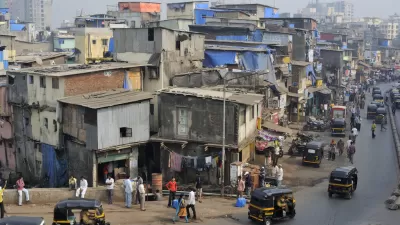Mumbai architect Pallavi Shrivastava reflects on the impact that the inaccessibility of the city has on the status of women in society and their ability to shape the future of the places in which they live.
Access to public space in cities like Mumbai is a privilege that many men likely take for granted. The threat of reprehensible behavior facilitated by planned and unplanned urban spaces forces women to devise "their own compromised mode of urban movement," writes Shrivastava, and ultimately limits their role in society.
"The very idea that women can be out in open urban spaces on their own is not a given in a society where paternalism is so often implicit in even the most well-meaning advice. It is unsurprising that we do not see many women in leadership roles here. With such a deeply ingrained habit of treating women as dependent, and therefore secondary citizens, how does India intend to provide equal access to urban spaces outside their homes?"
"We need to make the city unequivocally a place of belonging, exploration and enjoyment," she argues. "Functional infrastructure in the form of safe public transport, toilets, well-lit streets, and safe urban spaces remains at the core of the issue. But access to public spaces like promenades, beaches, sidewalks, parks, libraries, and running tracks are already required of a well-designed and inclusive city irrespective of gender, sexual orientation, ethnicity or economic class."
"It is our public spaces that communicate a city's attitude towards its citizens. The presence of well-designed infrastructure and inviting places are a measure of its inclusiveness. Can we design urban spaces that are sensitive to everybody?"
FULL STORY: A woman's right to enjoy the city

Alabama: Trump Terminates Settlements for Black Communities Harmed By Raw Sewage
Trump deemed the landmark civil rights agreement “illegal DEI and environmental justice policy.”

Planetizen Federal Action Tracker
A weekly monitor of how Trump’s orders and actions are impacting planners and planning in America.

How Atlanta Built 7,000 Housing Units in 3 Years
The city’s comprehensive, neighborhood-focused housing strategy focuses on identifying properties and land that can be repurposed for housing and encouraging development in underserved neighborhoods.

In Both Crashes and Crime, Public Transportation is Far Safer than Driving
Contrary to popular assumptions, public transportation has far lower crash and crime rates than automobile travel. For safer communities, improve and encourage transit travel.

Report: Zoning Reforms Should Complement Nashville’s Ambitious Transit Plan
Without reform, restrictive zoning codes will limit the impact of the city’s planned transit expansion and could exclude some of the residents who depend on transit the most.

Judge Orders Release of Frozen IRA, IIJA Funding
The decision is a victory for environmental groups who charged that freezing funds for critical infrastructure and disaster response programs caused “real and irreparable harm” to communities.
Urban Design for Planners 1: Software Tools
This six-course series explores essential urban design concepts using open source software and equips planners with the tools they need to participate fully in the urban design process.
Planning for Universal Design
Learn the tools for implementing Universal Design in planning regulations.
Jessamine County Fiscal Court
Caltrans
Institute for Housing and Urban Development Studies (IHS)
City of Grandview
Harvard GSD Executive Education
Toledo-Lucas County Plan Commissions
Salt Lake City
NYU Wagner Graduate School of Public Service




























